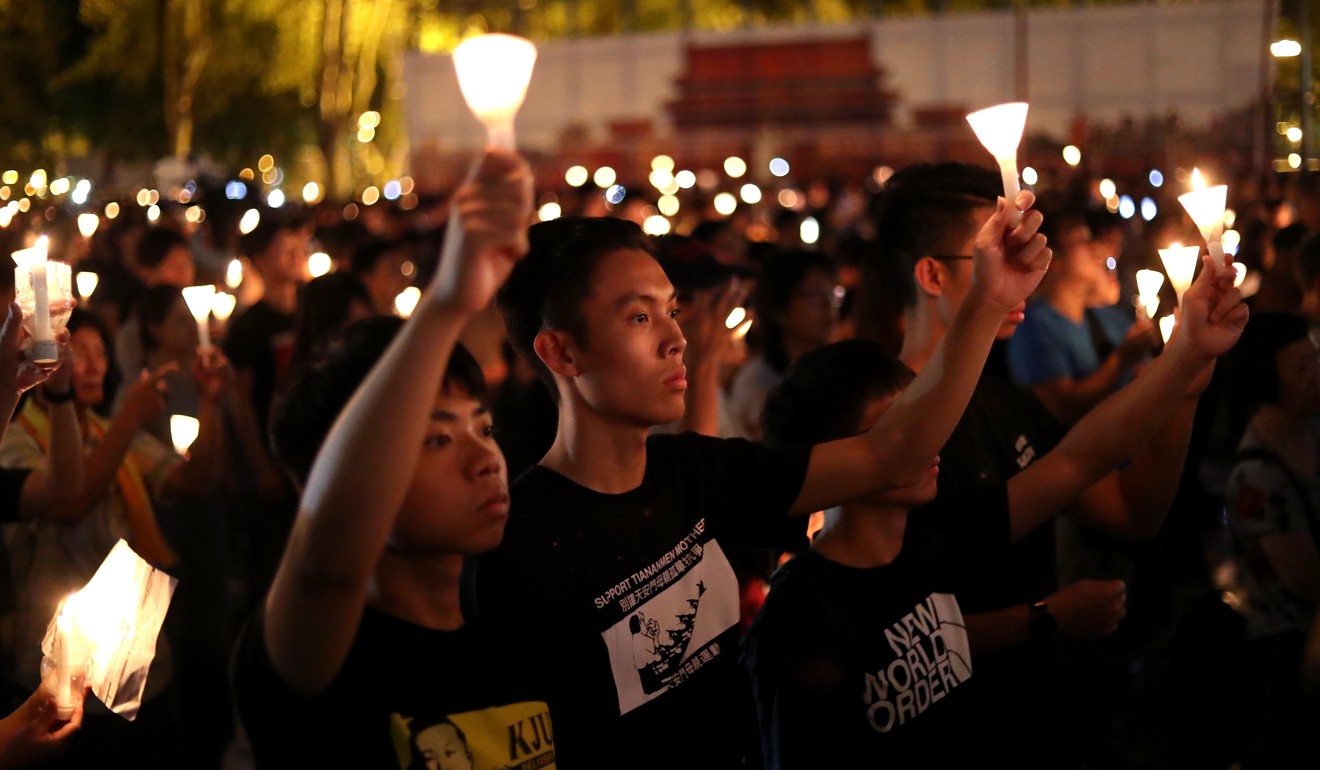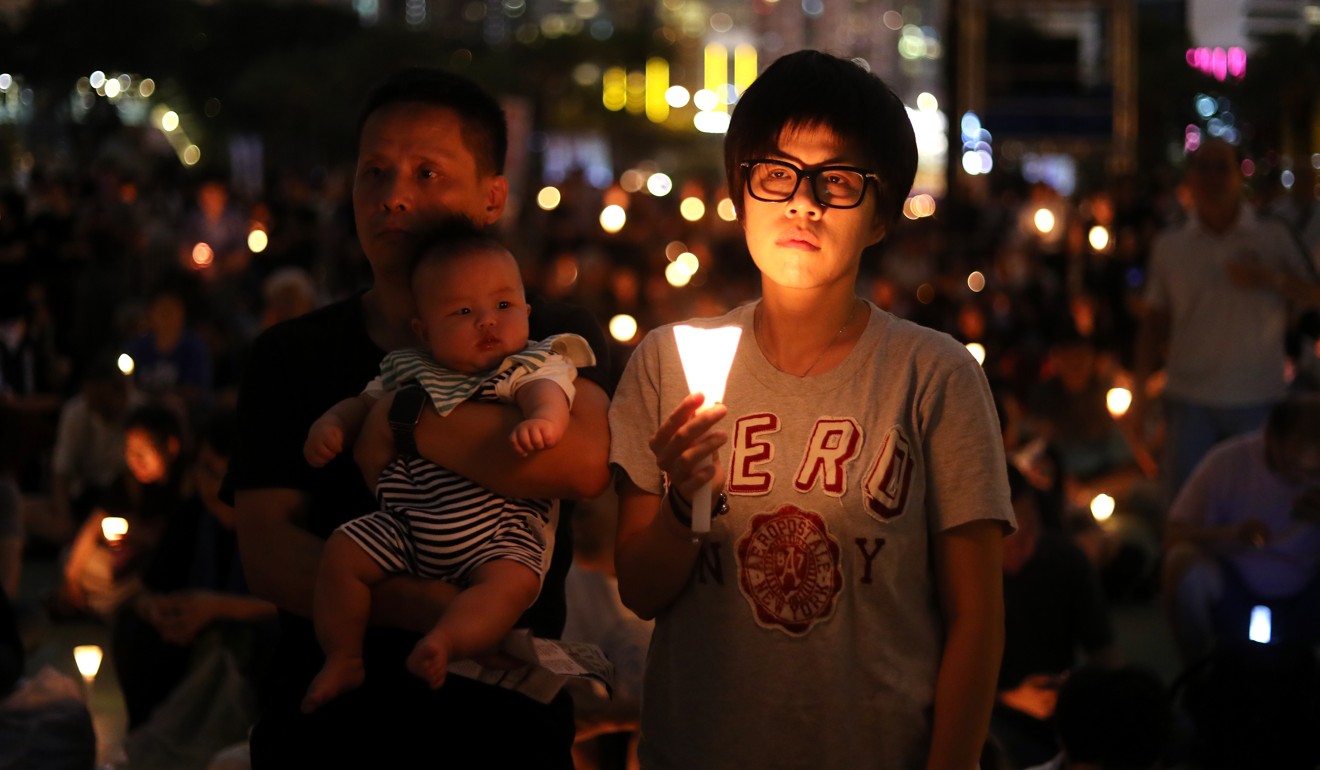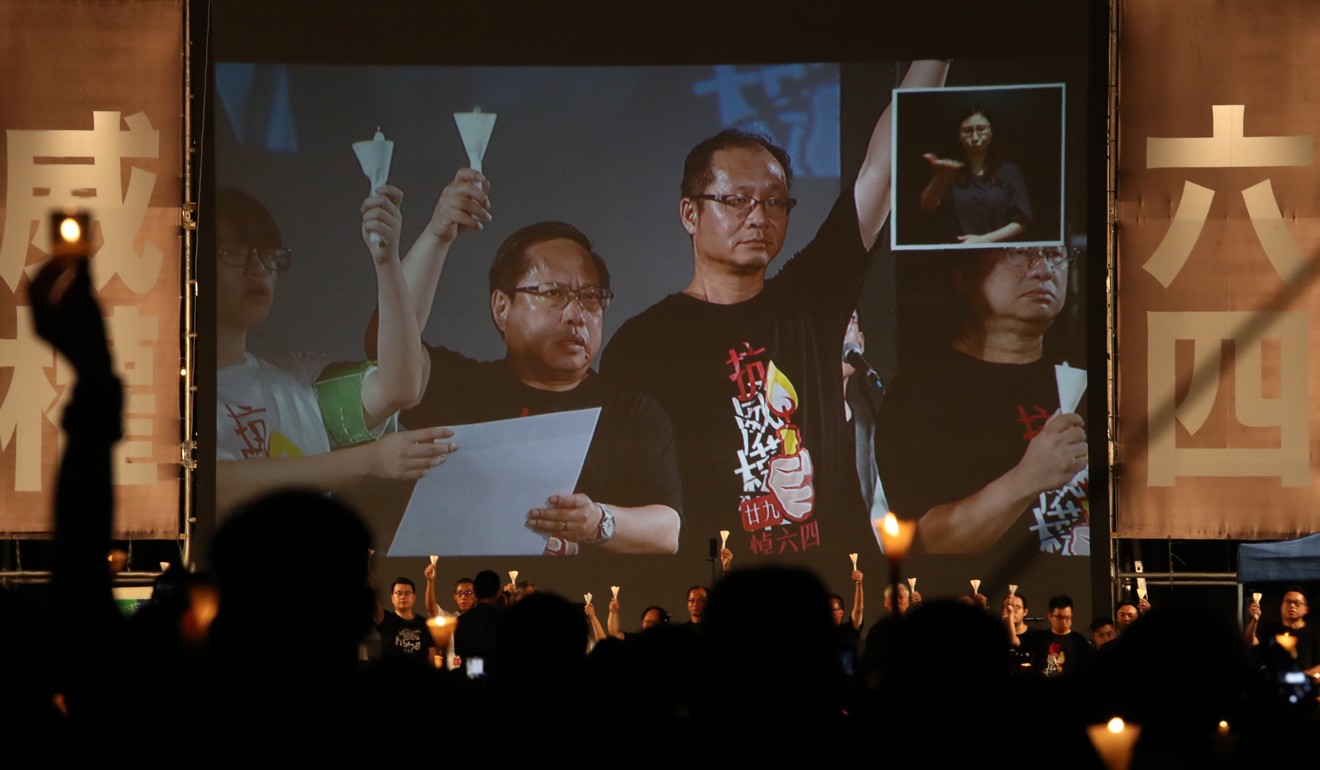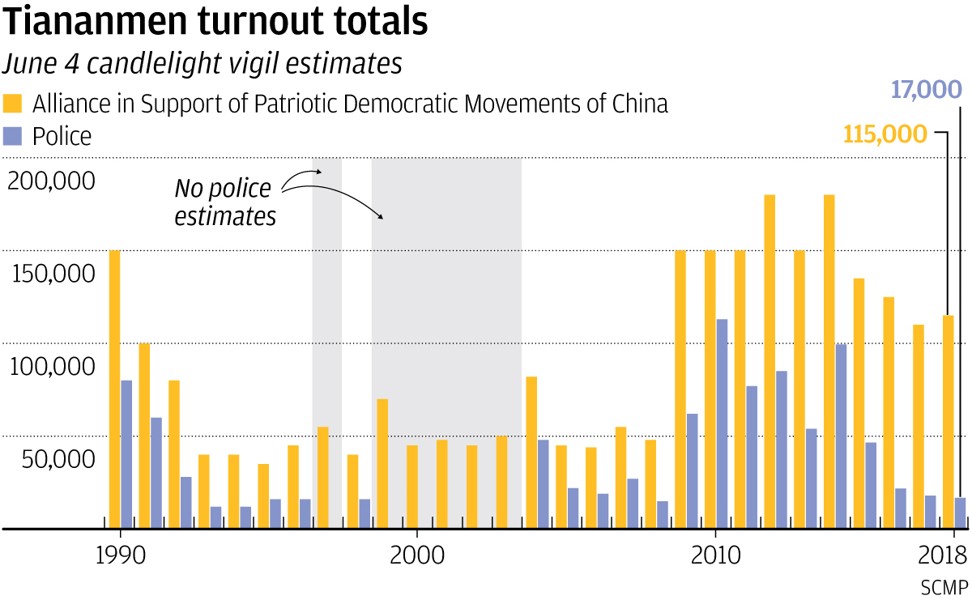June 4 vigil turnout beats expectations as Hong Kong organisers call for mass showing at next year's 30th anniversary of Tiananmen Square crackdown
Peaceful commemoration in Victoria Park ends with march to Beijing's liaison office in city, while central government slams US call for China to disclose details of the crackdown, accusing it of issuing statements of ‘gratuitous criticism’ every year

Tens of thousands of people gathered at Hong Kong’s Victoria Park on Monday for the annual candlelight vigil to mourn those killed in Beijing’s bloody military crackdown on pro-democracy protesters 29 years ago, defying expectations that the turnout – declining in recent years – would further dwindle.
Organisers said 115,000 people showed up for this year’s Tiananmen vigil – 5,000 more than last year – though police put the figure at 17,000, down from last year’s 18,000.
From students to families to senior citizens, those in attendance perched on small stools, sat on plastic sheets or lingered by the sides of the park’s six football pitches, facing a makeshift stage and screens.
As rain gave way to a cool breeze, organisers led them in rousing chants of “End to the one-party dictatorship!” and “Building a democratic China!”
The first of those two chants was controversial. Earlier this year, Tam Yiu-chung, Hong Kong’s sole delegate to China’s top legislative body, the Standing Committee of the National People’s Congress, warned that Hongkongers who call for an “end to one-party dictatorship” risk disqualification from public office.

Hong Kong is the only place on Chinese soil where such large-scale commemoration of the bloody incident – the exact death toll of which remains unknown – takes place.
But attendance in recent years has dipped amid rising localist sentiment. University student unions snubbed the event for the second year in a row, saying it was not the city’s responsibility to spur democratic development in mainland China and end one-party rule.
Albert Ho Chun-yan, chairman of the Hong Kong Alliance in Support of Patriotic Democratic Movements of China, which organises the vigil yearly, said many young people turned up despite the student union boycott.
But Chinese University political scientist Ivan Choy Chi-keung said the number of young people was nothing compared with a few years ago, when the movement hit its peak.
“We used to see a great number of pupils in school uniform coming in groups, or maybe with their teachers, but I did not see such scenes today,” he said.
Baptist University student Wong Nga-man, who was at the site, said while she treasured her identity as a Hongkonger, “localist issues and discussion of the Tiananmen massacre should not be mutually exclusive”.
The atmosphere was peaceful as attendees, many dressed in black, sang patriotic songs and quietly observed the goings-on on stage, including speeches, musical tributes and the laying of a wreath at the replica of Tiananmen Square’s Monument to the People’s Heroes. High school boy band Boyz Reborn performed The Song of Freedom, which included the lyric: “When your voice has disappeared … The singing of the song of freedom has to be continued by me.”

There were also recorded videos from those whose loved ones sacrificed their lives fighting for greater freedom, including Li Wenzu, wife of detained mainland human rights lawyer Wang Quanzhang, and Di Mengqi, a member of Tiananmen Mothers, an association of parents who lost children in the 1989 crackdown.
Di recalled her son, Wang Hongqi, 19, bid her goodbye when he left home for work on June 3, 1989, but never returned as he was shot dead by soldiers.
I hope the state can step forward to clarify its stance on the massacre
“As a mother, I hope the state can step forward to clarify its stance on the massacre,” Di said. “If not, I’ll not close my eyes in my grave.”
Outside the park, dozens of pro-Beijing protesters denounced the vigil. They accused the alliance of “scamming” the public for money and claimed there was never a “massacre” at Tiananmen Square.
In response to a question about the vigil in Victoria Park, Hong Kong’s leader Carrie Lam Cheng Yuet-ngor on Tuesday said the city respected freedom of speech and expression.
“A rally and a march were respectively held last night with the police’s cooperation,” she said, speaking before her weekly meeting with the Executive Council. “That has reflected Hong Kong’s characteristics of respecting and advocating freedom of speech.”
In the United States, Secretary of State Mike Pompeo urged China to disclose the details of the crackdown.
“We remember the tragic loss of innocent lives,” Pompeo said in a statement. “We join others in the international community in urging the Chinese government to make a full public accounting of those killed, detained or missing.”
Meanwhile, the chairmen of US Congressional-Executive Commission on China reiterated their call for the Chinese government to “end prohibitions of public and online discussion about the event”.
“I call on the Chinese government to allow free and open discourse surrounding the events of that spring,” Marco Rubio, the commission’s chairman, said.
He also asked the Chinese government to “unconditionally release those detained or imprisoned for attempting to commemorate the anniversary”, and “to reckon publicly with the horrific violence against the Chinese people at the hands of the [Communist] Party and the military”.
Rubio urged American corporations to be “clear-eyed” that any technology or crime control equipment sold to Chinese security forces and police “may be used or abused to further repression, surveillance, detention or other abuses”.
Christopher Smith, the commission’s co-chairman, said people commemorated the Tiananmen crackdown every year because it is an event “too important to forget and too dangerous to commemorate in China”.
He said repression in China continued after the violent incident.
“By nearly every measure, China is today as intolerant of dissent as it’s ever been, if not more,” said Smith.
“A firm stand in support of freedom, the rule of law, and human rights in China will be beneficial both to the future of China, and peace and prosperity in the world.”
Beijing in response lodged “stern representations” with the US, foreign ministry spokeswoman Hua Chunying said on Monday. She accused the US of issuing statements of “gratuitous criticism” every year and interfering in China’s internal affairs.
“China long ago reached a clear conclusion about the events of that era … The US secretary of state has absolutely no qualifications to demand the Chinese government do anything,” Hua said.
Taiwanese President Tsai Ing-wen said if Beijing could face up to what happened it could become the bedrock for China’s own democratic transformation. “I hope both sides of the strait can enjoy the universal values of freedom and democracy,” she said in a post written in simplified Chinese – primarily used in mainland China, and not in Taiwan – on her Facebook page.
As the vigil drew to a close at 10pm, six groups of activists, including two student groups, prepared for their annual march to Beijing’s liaison office in the city, in Sai Wan. The march was expected to take about two hours, and hundreds of people trailed behind as they set off.
Choy said the turnout had not changed much from a year earlier as the social atmosphere in Hong Kong remained unchanged, with the political mood “at a low point” following the 2014 Occupy protests for greater democracy, which fizzled out after 79 days.
“The key is how many people will show up next year when we commemorate the 30th anniversary of the crackdown,” Choy said.
Ho called for, and predicted, a bigger turnout next year.

“I’m expecting that next year we will have a very, very high turnout showing the common will and determination of people fighting for democracy in China,” he said.
Alliance secretary Lee Cheuk-yan, noting the 30th anniversary next year, said: “Let’s work together and spread our messages to our communities, schools and every corner of the city.”
The group is organising an exhibition on Tiananmen in Shek Kip Mei until June 10m, and Lee said it hoped to establish a permanent June 4 museum before next year’s vigil.
Reporting by Tony Cheung, Jeffie Lam, Su Xinqi, Sum Lok-kei, Ng Kang-chung and Kimmy Chung
